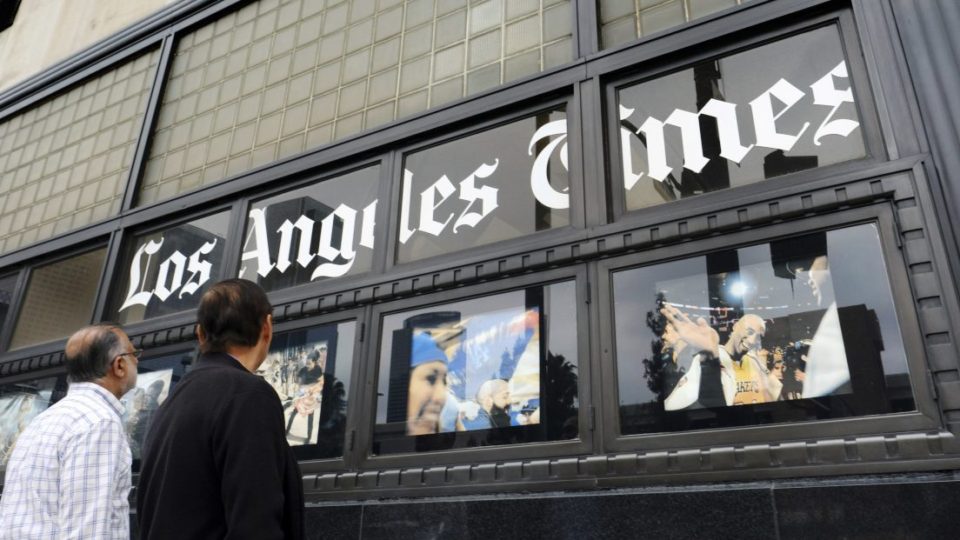200+ Journalists of Color, Women Could Benefit
Did Media Enable Black Men in Drinking Trump’s Kool-Aid?
Escobar Named Editor of Philadelphia Inquirer
Military Vets Seeking J-Jobs Land Knight Grant
Short Takes
Support Journal-ismsHomepage photo credit: LATV
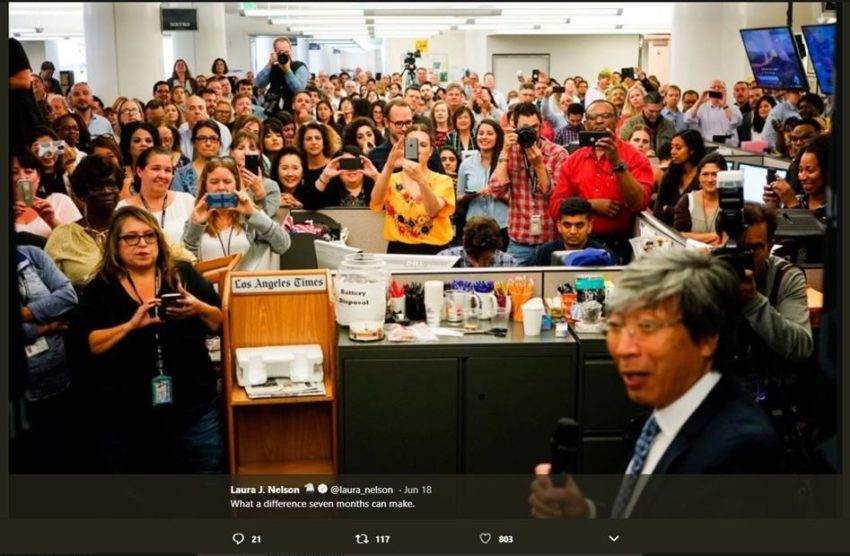
200+ Journalists of Color, Women Could Benefit
“The Los Angeles Times and Tribune Publishing have agreed to pay $3 million to resolve a class-action lawsuit brought by a multiethnic group of journalists who alleged that they were paid less than their white male counterparts,” Meg James reported Wednesday for the Times.
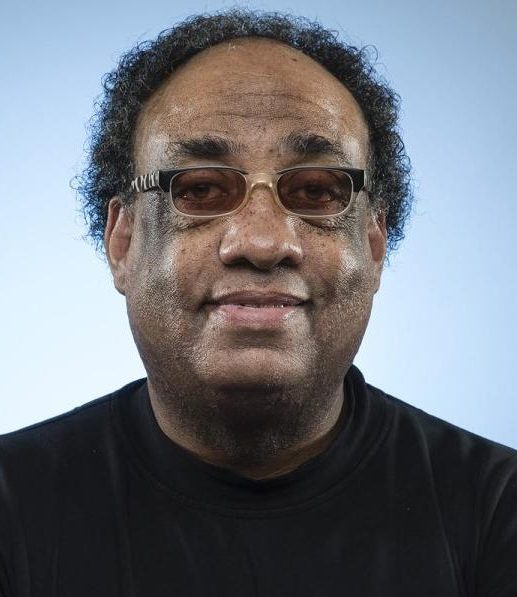 “The lawsuit, which alleged gender, race and ethnic discrimination, was filed in San Bernardino County Superior Court in June. Late last month, Judge David Cohn gave preliminary approval to the proposed settlement and certified a class of nearly 240 current and former reporters and editors who would be eligible for back pay.
“The lawsuit, which alleged gender, race and ethnic discrimination, was filed in San Bernardino County Superior Court in June. Late last month, Judge David Cohn gave preliminary approval to the proposed settlement and certified a class of nearly 240 current and former reporters and editors who would be eligible for back pay.
“Under the settlement, all Black and Latino reporters, copy editors and line editors employed by The Times from Feb. 14, 2015, to Oct. 26, 2020, could receive a portion of the award. All women who worked as reporters or editors during that period would be covered. Cohn is expected to give final approval to the settlement at a March hearing.
The $3-million settlement would be paid by the two publishing companies and their insurance carriers. Chicago-based Tribune Publishing owned The Times until June 2018, when it was sold to Patrick and Michele Soon-Shiong, returning the paper to local control.
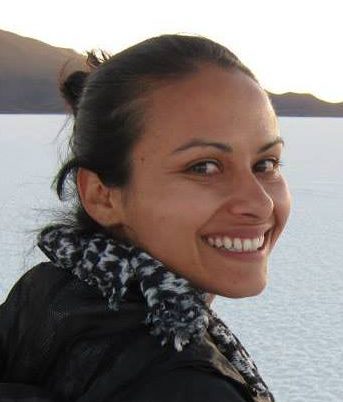 “The class-action lawsuit alleged The Times violated California’s Equal Pay Act and California’s Business and Professions Code.
“The class-action lawsuit alleged The Times violated California’s Equal Pay Act and California’s Business and Professions Code.
“The two companies have denied the allegations. They did not admit any wrongdoing or any violations of state law.
“The claims date back a number of years to previous ownership,” Hillary Manning, spokeswoman for The Times, said in a statement. “We’re pleased that the judge gave preliminary approval to the settlement and that the matter is headed toward a resolution.”
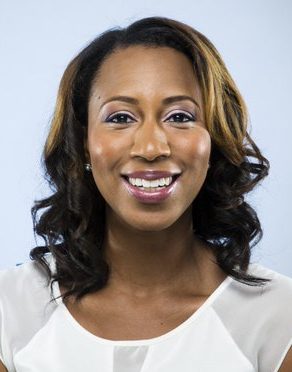 “Tribune Publishing declined to comment.
“Tribune Publishing declined to comment.
“The dispute originated in early 2018, when the paper was owned by Tribune. Frustrated by years of mismanagement and stagnant pay, the newsroom voted to join the NewsGuild sector of the Communications Workers of America. The Times’ nascent guild demanded that Tribune provide salary data for newsroom employees.
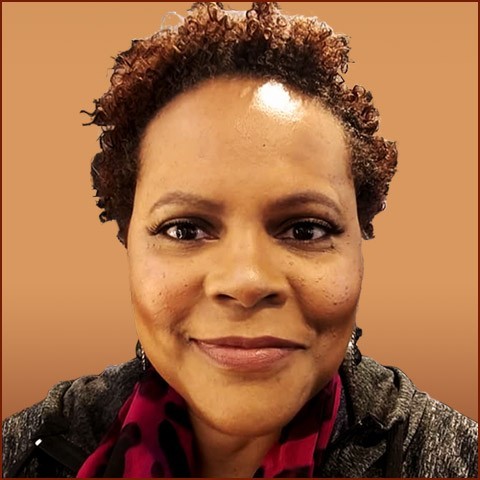 “The data confirmed long-standing suspicions that the salaries of women and people of color lagged behind those of white male colleagues, said Pulitzer Prize-winning reporter Bettina Boxall, who became the lead plaintiff in the class-action lawsuit.
“The data confirmed long-standing suspicions that the salaries of women and people of color lagged behind those of white male colleagues, said Pulitzer Prize-winning reporter Bettina Boxall, who became the lead plaintiff in the class-action lawsuit.
“Boxall was joined by reporters Greg Braxton (photo) and Paloma Esquivel; (second photo), former reporter Angel Jennings (third photo); copy editor Angela Jamison (bottom photo); and Deputy Metro Editor Bobbie ‘B.J.’ Terhune. Boxall and Terhune are white; Esquivel is Latina; and Braxton, Jennings and Jamison are Black. . . .”
Did Media Enable Black Men in Drinking Trump’s Kool-Aid?
Biden campaign ad features Black men. (Credit: YouTube)
No matter how many times one declares that “Black people are not a monolith,” the factoid that an estimated 18 percent of Black men voted for Donald Trump can’t easily be explained away. The question from this corner is that if so many drank the president’s Kool-Aid, how much can be attributed to the news media — and how much to a lack of media literacy?
To be clear, 80 percent of Black men supported Democratic President-elect Joe Biden. That figure is down slightly from Hillary Clinton’s 82 percent in 2016, but significantly below Barack Obama’s 95 percent in 2008 and 87 percent in 2012, according to Mara Ostfeld and Michelle Garcia of NBC News.
Tim Graves, 58, a Black man from Jacksonville, Fla., was among the 18 percent. NPR’s Noel King asked him Tuesday, “Give me an example of a moment where you heard President Trump speak and you really did feel included.”
Graves responded, “Yes, ma’am. No. 1 — after almost 40 years of promises from every president up to Donald Trump, historically Black colleges for the first time got long-term funding.
“No. 2 — the lowering of Black unemployment is absolutely incredible. Of course, we know that it is the top that it’s ever been in the country, prior to COVID. And No. 3 . . . I mean, what do we have to lose? I mean, from the point that [Lyndon] Johnson and the Democratic Party back in the late ’60s and early ’70s made policies that take Black men out of the house with welfare, and that’s been one of their goals since then is to make sure that Blacks in general remain on government assistance, and they can keep that vote.”
Contrast that with The Washington Post’s Oct. 23 fact-checking by Glenn Kessler, Salvador Rizzo and Meg Kelly. Trump boasted in the second presidential debate, “Nobody has done more for the Black community than Donald Trump. And if you look, with the exception of Abraham Lincoln, possible exception, but the exception of Abraham Lincoln, nobody has done what I’ve done.”
The Post reporters wrote, “Trump appears to base this assertion on pre-coronavirus employment figures and some relatively minor actions taken during his administration. Historians say this claim is ridiculous.
“Trump has taken few actions specifically on behalf of African Americans.”
Moreover, ProPublica wrote in August, “Black workers have been more likely to be unemployed in both the current downturn and in past recessions. Even when the economy is healthy, Black unemployment is dramatically higher — often double — that of white workers. The gap cannot be explained by gender, age or education level. (Were it not for the fact that Black workers are overrepresented in transit and service industry jobs currently deemed ‘essential,’ the rate of Black unemployment today would be even worse.)”
As for HBCUs, Inside Higher Ed’s Paul Fain reported in January, “the White House and the U.S. Department of Education can make legitimate points when touting their support for the sector.” But Fain also quoted HBCU administrators who told him “the administration’s overall record with HBCUs has been mixed. . . . The administration’s rhetoric also has at times angered students, faculty members and administrators at HBCUs.”
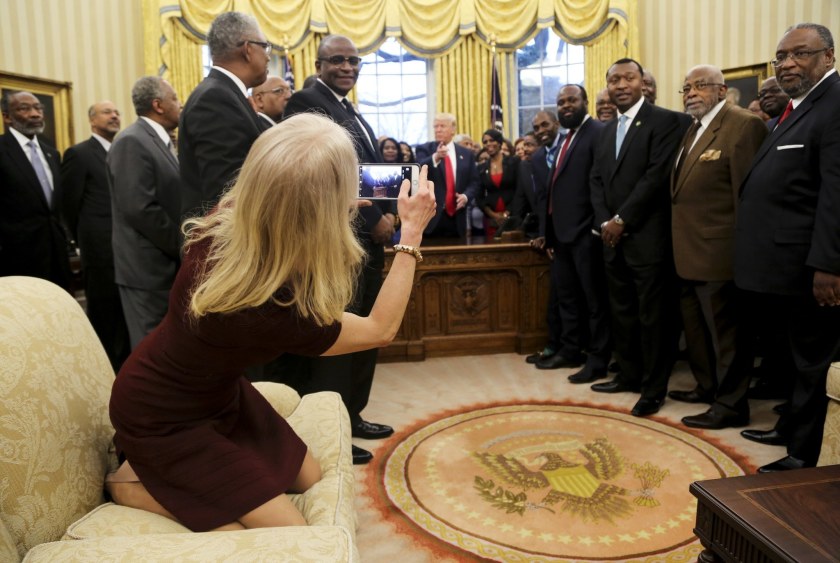
In general, the reasons given for Black men, particularly younger ones, bonding with Trump are an admiration for Trump’s bravado, their admiration of his persona on his reality television show “The Apprentice,” his endorsement by rappers such as Ice Cube, Kanye West, Lil Wayne (pictured below) and 50 Cent, and anger at Biden’s support of the 1994 crime bill. Critics have said the law contributed to mass incarceration.
Mike Webb, senior vice president of communications for the News Literacy Project, acknowledged that no one factor explains Trump’s support. He added disinformation to the mix.
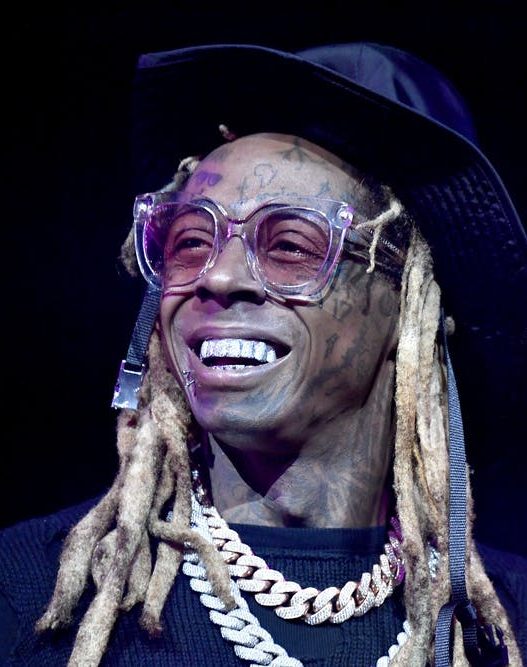 Webb messaged Journal-isms, “As we discussed on our podcast interview with UNC’s Deen Freelon, during the 2016 campaign, agents from Russia’s Internet Research Agency attempted to disguise themselves as Black protestors to intensify the partisan divide and suppress the vote, and all indications are they meddled again in 2020. It’s too soon to tell how much there was, who did it, how it was done or if it was effective, but that’s one of the main reasons we put together this PSA campaign to combat election misinformation. We also know from several different news reports that there were efforts to create disinformation targeted to the Latino community this year.
Webb messaged Journal-isms, “As we discussed on our podcast interview with UNC’s Deen Freelon, during the 2016 campaign, agents from Russia’s Internet Research Agency attempted to disguise themselves as Black protestors to intensify the partisan divide and suppress the vote, and all indications are they meddled again in 2020. It’s too soon to tell how much there was, who did it, how it was done or if it was effective, but that’s one of the main reasons we put together this PSA campaign to combat election misinformation. We also know from several different news reports that there were efforts to create disinformation targeted to the Latino community this year.
“I think the best way to combat this problem is to ensure that everyone is news literate. People need to have the skills to be able to recognize the types of ploys that are used during elections and other times so that they can develop the ability to determine credible news sources and to stick to sharing information from fact-based news organizations. Otherwise we’ll remain vulnerable to the bad actors who are pushing misinformation during election season and our democracy will be in danger of being overrun with false information.”
This column provided more context to the crime bill discussion after the second presidential debate. Noted there was a comment from John A. Tures, who wrote for the Observer last year that “evidence shows that Trump’s own crime policies from that era, written in his book for his Reform Party campaign in 2000, were far tougher than anything Biden ever supported. Trump’s own support of criminal justice reform late last year reverses his prior hard core crime positions, but he’s got to battle his own party and administration on it.”
Moreover, the crime-bill narrative leaves out Trump’s 1989 call for the death penalty for the Black and brown men then known as the Central Park Five. They were later exonerated and Trump has never apologized.
Randal Pinkett, speaks about the “Achilles heel” that Trump has had “all these years.” (Credit: Canadian Broadcasting Corp./ YouTube)
Concerning “The Apprentice,” Randal Pinkett, a then-34-year-old African American who won season 4, has written of Trump, “He didn’t want to see an African American win his show, not outright.”
Democrats put forth their own point-by-point rebuttals to Trump’s assertions on racial issues in August.
The Black Trumpers’ common cause with rappers, whose characterization of “bitches and hos” has been indulged in by far too many, irked Michael Steele, the former Republican national chairman who joined the anti-Trump Lincoln Project.
Appearing with columnist and economist Julianne Malveaux Monday on Washington’s WPFW-FM, Steele called “astounding” “the number of Black men who still supported that level of misogyny and attack women.
“I love the way James Clyburn, the House majority whip, put it. He said, ‘I am the son of a Black woman, and the husband of a Black woman, I’m the father of a Black woman. To see Black men share his description of a Black woman [Vice President-elect Kamala Harris] as a monster, or a dog [Omarosa Manigault-Newman] as he has on other occasions, should think twice about their support . . . .
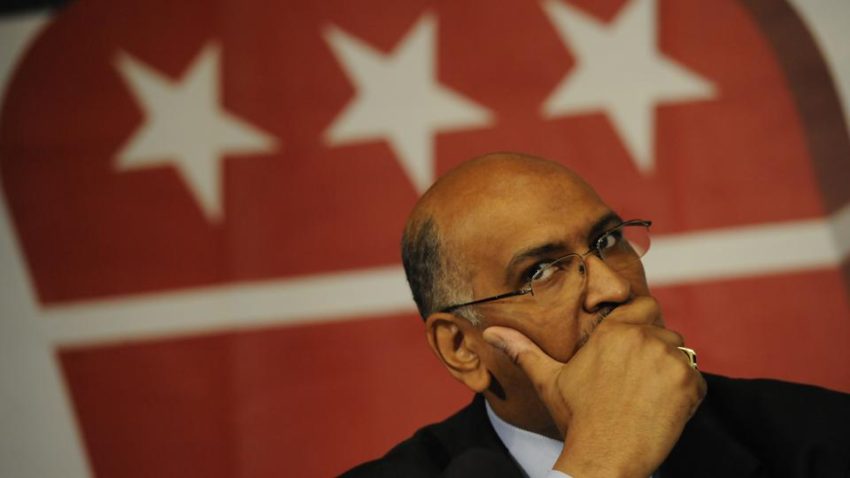
“I really took that to heart because it does go to a lot of things that, you know, we have to reconcile in the whole community. The fact that so many — about 18 percent of Black men supported the president, despite everything that he said about our community, where our ancestors have come from, the cities we live in, like Baltimore, and our women.”
Steele also scoffed at the so-called “Platinum Plan for Black America” put forth by Ice Cube, who said he would help the Trump campaign develop it. The actor and hip-hop artist said he had reached out to both the Trump and Biden campaigns and that only the Trump campaign had immediately engaged.
“We get that entrepreneurial part,” Steele said. “But what we also recognize is that there’s much more to it than just the entrepreneurism. You can put out an opportunity zone all day long, but if the educational system within that opportunity zone is failing my kids, or if the banks aren’t really lending the kind of money that they would otherwise, or if the crime on the streets or the relationship with the police is not right, all I’ve got is two words put together on a piece of paper, and so there’s got to be more to it.
“When I ran for [Maryland] lieutenant governor, and talked about these issues, we connected all the dots. In fact, I tied it back into our prison system, and looked at Eagle Street Academy, which was then the only high school prison in the country — where we have 13- and 14-year-old young men in the prison.
“So I just want to completely link all the dots, not just talk about — you can have a big house, and you can have wealth, and you can [run] your own business, all of that’s great, and all of that’s part of the dream, but if you don’t connect all those other pieces, when you get pulled over by that police officer you have to worry about the next 8 minutes and 46 seconds of your life.”
That brings us back to the media.
Karen Finney, a Democratic strategist and commentator, was asked about the Black male Trumpers Saturday on NPR’s “All Things Considered.” Finney told Michel Martin, “They are a group that was once again, as we saw in 2016, heavily targeted with misinformation and disinformation. I heard many on the radio saying things like ‘you’re going to, you know, legislate feminism,’ having no idea what something like that would come from. So I think we have to look at that.
“But we also have to look at what their concerns were and whether or not we do a good enough job reaching people where they are and having a conversation about the issues they care about. Obviously, in this campaign, I did a bunch of work for the Congressional Black Caucus and the DCCC.
“And combating racism, criminal justice reform and policing reforms were two of the top issues. And in some instances, voters weren’t aware, frankly, of the work that was already being done. And so I think we have to ask ourselves — we have a structural problem as well as, you know, making sure that people know the work that is being done.”
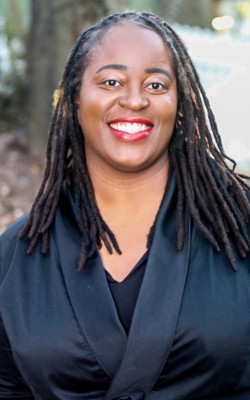 Some are trying. In May, Nsé Ufot (pictured), executive director of the New Georgia Project Action Fund, wrote for The New York Times, “We also need foundations, state and federal governments and the Democrats to help prevent and neutralize disinformation campaigns. Bad actors are online, sowing doubts about basic facts to undermine faith in the democratic process. To counter this, the industry ought to invest in trusted messengers to spread competing messages with good information, in addition to inspirational candidates who can alleviate voters’ concerns.
Some are trying. In May, Nsé Ufot (pictured), executive director of the New Georgia Project Action Fund, wrote for The New York Times, “We also need foundations, state and federal governments and the Democrats to help prevent and neutralize disinformation campaigns. Bad actors are online, sowing doubts about basic facts to undermine faith in the democratic process. To counter this, the industry ought to invest in trusted messengers to spread competing messages with good information, in addition to inspirational candidates who can alleviate voters’ concerns.
“My organization is doing its part. We’re building mobile video games to educate new and infrequent
voters and are launching programs to monitor social media and provide media literacy that will
compete for Black voters’s hearts, minds, attention and votes.”
Ufot added, “A vibrant, robust democracy is our greatest weapon against authoritarian rule. And Black people have been at the vanguard of fighting for that democracy. This year, more than ever, we need overwhelming participation in our elections to neutralize voter suppression and halt the rise of despotic, unaccountable leaders. Our liberty and our lives are at stake.”
- Kareem Abdul-Jabbar, Los Angeles Times: We may be a divided nation, but we’re united in not trusting the news media
- Jenice Armstrong, Philadelphia Inquirer: I’m rooting for Joe Biden but he’s wrong when he says, ‘This is not who we are.’ (Nov. 4)
- Kimberly Atkins, Boston Globe: Black women must walk between demanding respect and being labeled ‘angry.’ And boy, have we had practice on that tightrope.
- Karen Attiah, Washington Post: America calls on Kamala Harris — and Black women — to clean up its mess
- Shree Baphna, AsAmNews: Kamala Devi Harris, the First of (hopefully) Many
- Nathalie Baptiste, Mother Jones: Is There Room for Black Conservatives in the GOP When the President Is Racist? “We get law and order. What we’re after is equality.” (Oct. 29)
- Bill Barrow, Associated Press: ‘Honor the ancestors’: Harris appeals directly to Black men (Oct. 23)
- Charles M. Blow, New York Times: Third Term of the Obama Presidency
- Josh Boak and Hannah Fingerhut, Associated Press: AP VoteCast: Trump, Biden coalitions show race, class divide (Nov. 4)
- Joyce Ferriabough Bolling, Boston Herald: Beyond symbolic win, Biden-Harris set to make more history
- Jarrett Carter Sr., HBCU Digest: Trump Executive Order Could Make HBCUs Ineligible for Nearly All Federal Funding (Oct. 10)
- Wayne Dawkins, Afro-American Newspaper: Trump is dumped, women of color held it down (Nov. 12)
- Elvia Díaz, Arizona Republic: Why Republican Martha McSally and Democrat Hiral Tipirneni are Arizona’s biggest losers
- Elvia Díaz, Arizona Republic: Why did Donald Trump get so many votes in the first place? That’s the defining question
- Ezekiel Emanuel, Andrea M. Cooke and Connor Boyle, Boston Globe: What Americans lose if the ACA is overturned
- Suzanne Gamboa and Carmen Sesin, NBC News: Trump’s gains among Latino voters shouldn’t come as a surprise. Here’s why.
- Dahleen Glanton, Chicago Tribune: By contesting the election, Trump is trying to disenfranchise millions of Black voters.
- Renée Graham, Boston Globe: Black people voted for democracy while Trump supporters chose white supremacy
- Ryan Grim and Akela Lacy, The Intercept: Biden Wins, but Now the Hard Part Begins
- Emil Guillermo, Asian American Legal Defense and Education Fund: Biden-Harris victorious as America celebrates democracy
- Murtaza Hussain, The Intercept: Nonwhite Voters Are Not Immune to the Appeal of Right-Wing Populism
- Indian Country Today: The Native vote turned out … so today it’s celebration
- Allen Johnson, News & Record, Greensboro, N.C.: Words will have consequences for first Black lt. gov.
- Jeremy B. Merrill and Ryan McCarthy, ProPublica: Trump Won Florida After Running a False Ad Tying Biden to Venezuelan Socialists (Nov. 12)
- Askia Muhammad, Washington Informer: Biden Won’t Win (Sept. 2)
- Svante Myrick, mayor of Ithaca, N.Y., National Newspaper Publishers Association: Black Americans Have Everything to Lose in This Election
- Ruben Navarrette Jr., Washington Post Writers Group: Latino voters send message
- Tony Norman, Pittsburgh Post-Gazette: To save democracy, kill the Electoral College and switch to the popular vote
- Andrés Oppenheimer, Miami Herald: Biden blew it with Miami’s Cuban, Venezuelan voters, and got clobbered
- Andrés Oppenheimer, Miami Herald: Biden vowed to be better for Latin America than Trump has been. Now, he has to deliver
- Jeneé Osterheldt, Boston Globe: Kamala the First? Breaking barriers — it’s complicated
- Clarence Page, Chicago Tribune: Yes, Donald Trump has Black and Latino supporters. Democrats can learn from it.
- Leonard Pitts Jr., Miami Herald: This election showed us just who we are as a nation — and it’s not very pretty
- Leonard Pitts Jr., Miami Herald: Blacks are supposed to reconcile with Trump supporters? Nah, not this time. You first
- Fabiola Santiago, Miami Herald: Adiós, Donald Trump. I won’t forgive or forget what you did to my Miami
- Fabiola Santiago, Miami Herald: Marco Rubio praised violence to kiss up to Trump, but watch him jump off the T-train
- David Scharfenberg, Boston Globe: Trump never delivered for aggrieved white America, but Biden can
- Brian Stelter, CNN: ‘Surreal.’ Reporters share what it was like to cover the Trump and Biden campaigns
- Stefan Townes, Indiana Daily Student, Indiana University: Why are rappers supporting President Donald Trump?
- Theresa Vargas, Washington Post: The most reassuring and troubling two words to accompany the election results: ‘The first’
- Elizabeth Wellington, Philadelphia Inquirer: We may want to talk about Kamala Harris’ style, but let’s resist the urge
- Juan Williams, The Hill: Too many men of color got conned by Trump
- Justin Worland, Time: America Had a Reckoning on Race This Year. The Election Showed How Little Has Changed
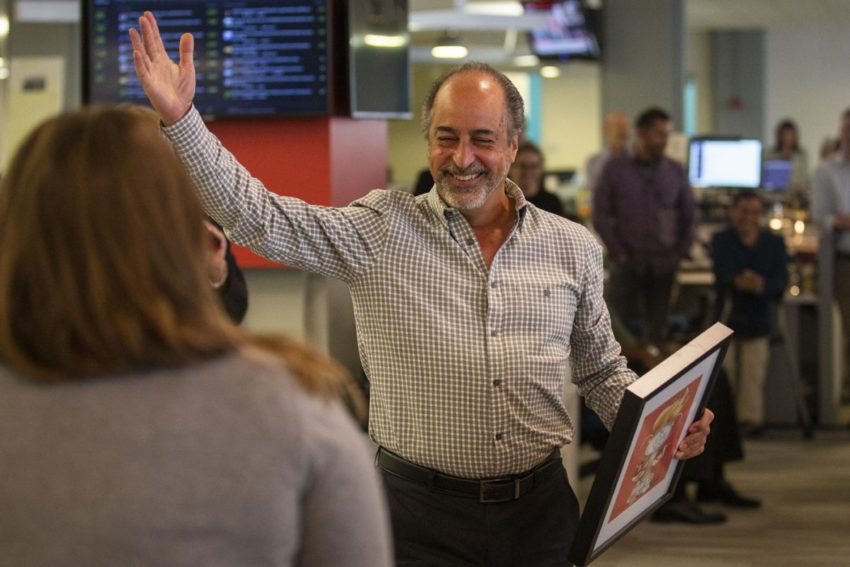
Escobar Named Editor of Philadelphia Inquirer
“Gabriel Escobar, a longtime journalist who has helped manage a rapid and sometimes tumultuous transformation at The Philadelphia Inquirer, has been named its top editor, responsible for the news operation as it chronicles life across one of the country’s largest metropolitan areas during a period of historic disruption and profound change,” Anna Orso and Jesenia De Moya Correa reported Wednesday for the Inquirer.
“Escobar, 64, has served as editor and vice president — the second in command of the newsroom — since 2017 and has been a driving force in its digital-first strategy and award-winning investigations. A former foreign correspondent, he is respected inside and outside The Inquirer as a skilled journalist and an even-keeled manager, as well as a deep listener always armed with a notepad.
“Under the title senior vice president and editor, Escobar, who was born in Colombia, will be one of the highest-ranking Latinos at a U.S. news organization. He’ll lead the staff of roughly 210 reporters, photojournalists, editors, designers and producers as the company navigates a turbulent year and an uncertain financial future. . . .”
Stan Wischnowski resigned as Inquirer editor in June after staff discontent over an insensitive “Buildings Matter, Too” headline on a column about the impact of civil unrest after the police killing of George Floyd. In September, he was appointed executive editor and vice president of the Pittsburgh Post-Gazette.
These world-class journalists give advice for Military Veterans in Journalism. #journalism #veterans pic.twitter.com/gW1c4L4GLs
— MVJ (@MVJNetwork) May 2, 2019
Military Vets Seeking J-Jobs Land Knight Grant
“Today, on Veteran’s Day, Knight Foundation is announcing $250,000 in new support for Military Veterans in Journalism (MVJ), a new professional organization that aims to put more veterans in newsrooms by supporting their career growth, building community and advocating for diversifying newsrooms through hiring and promoting vets,” the foundation announced Wednesday.
“Their important work provides a pathway for veterans looking to continue their life of service as journalists.
“Our new support for MVJ will also help fill a gap in newsroom diversity: though 7% of Americans are military vets, the same group makes up only 2% of journalists. As American news leaders continue to push for newsrooms that reflect the communities they serve, it’s absolutely critical we take America’s veterans into account.”
 Zack Baddorf (pictured), executive director of the group and a former Navy photojournalist, messaged Journal-isms that the organization has about 340 members.
Zack Baddorf (pictured), executive director of the group and a former Navy photojournalist, messaged Journal-isms that the organization has about 340 members.
“To try to play catch up, we asked our members who signed up before we included this info in our sign up form about their race/ethnicity,” Baddorf said, responding to a question about the group’s diversity. “New member and old member data combined, we have 44 people who provided their race/ethnicity to us.
“- 10/44 answered Yes to Are you of Hispanic, Latino, or Spanish origin?
“Then breakdown out of 44:
“- 6 Asian
“- 7 Black or African American
“- 1 Irish American
“- 2 Native American or Alaska Native
“- 1 Puerto Rican
“- 27 White
“- 1 no answer.”
A separate group, the Military Reporters & Editors Association (MRE), is for working journalists who regularly cover the United States military at home and abroad. Founded in 2002, it has about 500 members. “We don’t have a formal relationship with Military Reporters and Editors (MRE) but we know many of their Board members and they are supportive of [our] mission,” Baddorf said. “Likewise, we are supportive of theirs.”
Short Takes
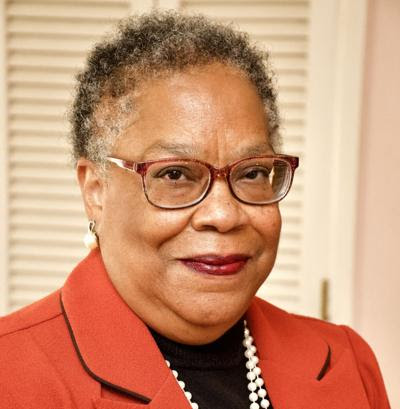 Linda Lockhart (pictured) a veteran of the St. Louis Post-Dispatch, St. Louis Public Radio and the St. Louis Beacon, has been named interim managing editor of The St. Louis American, the newspaper announced Tuesday. The newspaper consistently wins honors in the annual contest of the National Newspaper Publishers Association, the Black press. “We have embarked on a national search for our editor of the future and foresee bringing in someone who will transform the media organization we have been, but Linda is a perfect interim managing editor to maintain and even elevate our newsroom as we complete that search,” Publisher Donald M. Suggs said.
Linda Lockhart (pictured) a veteran of the St. Louis Post-Dispatch, St. Louis Public Radio and the St. Louis Beacon, has been named interim managing editor of The St. Louis American, the newspaper announced Tuesday. The newspaper consistently wins honors in the annual contest of the National Newspaper Publishers Association, the Black press. “We have embarked on a national search for our editor of the future and foresee bringing in someone who will transform the media organization we have been, but Linda is a perfect interim managing editor to maintain and even elevate our newsroom as we complete that search,” Publisher Donald M. Suggs said.
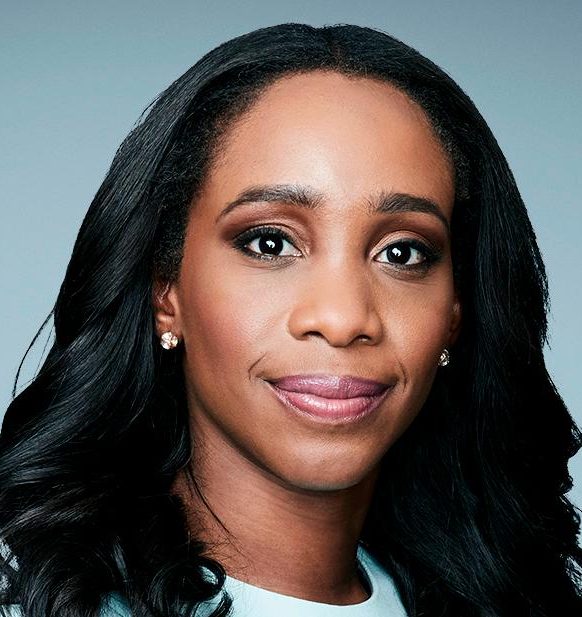 “Abby Phillip (pictured), The White House correspondent who has featured in CNN’s coverage of the suspenseful ballot count for the US presidential election over the past few days has also become a social media sensation locally after her T&T connections were revealed,” the New York Carib News reported Monday, referring to Trinidad and Tobago. “Her parents are Trinidadians June and Carlos Phillip, a psychology program manager for the District of Columbia Public Schools in Washington and her mother is a realtor and real estate investor.” Phillip, 31, grew up in Bowie, Md., in the D.C. suburbs.
“Abby Phillip (pictured), The White House correspondent who has featured in CNN’s coverage of the suspenseful ballot count for the US presidential election over the past few days has also become a social media sensation locally after her T&T connections were revealed,” the New York Carib News reported Monday, referring to Trinidad and Tobago. “Her parents are Trinidadians June and Carlos Phillip, a psychology program manager for the District of Columbia Public Schools in Washington and her mother is a realtor and real estate investor.” Phillip, 31, grew up in Bowie, Md., in the D.C. suburbs.
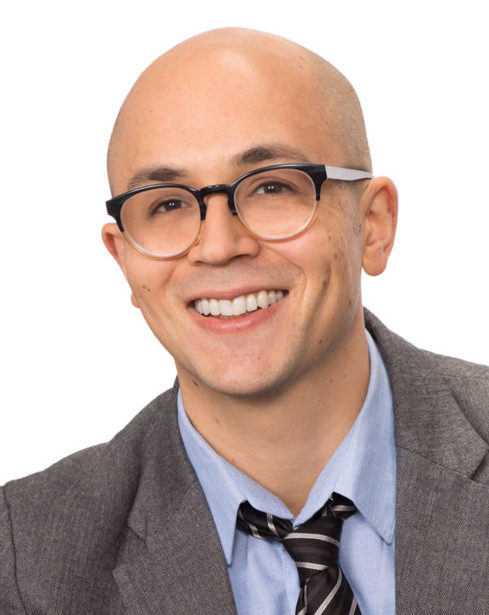 Morgan State University’s School of Global Journalism & Communication announced Monday it will award the 2020 Vernon Jarrett Medal for Journalistic Excellence to Errin Haines, editor-at-large of The 19th, which reports on the intersection of gender, politics and policy, and Adam Serwer (pictured), staff writer of The Atlantic. The medal is to be presented virtually on Thursday at an 11:30 a.m. EST ceremony.
Morgan State University’s School of Global Journalism & Communication announced Monday it will award the 2020 Vernon Jarrett Medal for Journalistic Excellence to Errin Haines, editor-at-large of The 19th, which reports on the intersection of gender, politics and policy, and Adam Serwer (pictured), staff writer of The Atlantic. The medal is to be presented virtually on Thursday at an 11:30 a.m. EST ceremony.
- “Two videographers filming a Wednesday night protest in downtown Los Angeles were detained and given ‘failure to disperse’ citations after police declared the gathering unlawful,” Kevin Rector reported Nov. 4 for the Los Angeles Times. “Vishal Singh, who works on Netflix documentaries and frequently attends and films local protests, and Sean Beckner-Carmitchel, an activist and videographer who also routinely attends protests, were both taken into custody near West 5th and South Hill streets downtown. . . .”
- “Public radio’s founding myth is one of goodness and decency; its purpose is delivering information in the interest of the American people,” Caroline Lester wrote Monday for Columbia Journalism Review. “But as public radio has grown in power and funding, its institutions have struggled to retain and promote women and people of color. Time and again, stations have protected employees accused of harassment, bullying, or discrimination, while pushing out those who complain. As Alicia Montgomery, a veteran of the public radio world, told me, ‘What’s really at the heart of this is abuse of power.’ . . .”
- “Thanks to a Local Marketing Agreement, Urban One in Columbus, OH has entered the local Hispanic market,” Radio Ink reported Friday. “The company will assume operating responsibility for WWCD-FM 102.5 from Southern Ohio Broadcasting System.”
- “The Reporters Committee for Freedom of the Press and a coalition of 24 media organizations are calling on New York City officials to dismiss charges against a photographer who was tackled by multiple police officers, arrested and charged with obstructing traffic as she reported on a recent demonstration,” the Committee said Friday. Chae Kihn, an independent photographer, was complying with law enforcement’s orders to move to the sidewalk when several officers tackled her to the ground.
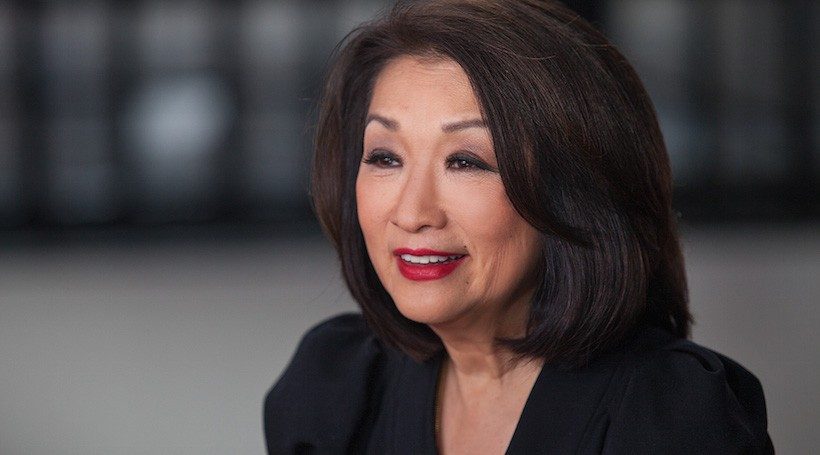 “Do not adjust your set — that really is Connie Chung (pictured) on HBO’s ‘The Undoing,’ ” Michael Starr reported Friday for the New York Post. “The retired newswoman, whose 30-year career spanned broadcast (ABC, CBS, NBC) and cable (CNN, MSNBC), makes an extremely rare appearance playing herself opposite series star Hugh Grant in an upcoming episode of the crime drama — in which Grant plays Dr. Jonathan Fraser, a seemingly respectable, compassionate Manhattan pediatric oncologist accused of brutally murdering his married mistress, Elena Alves (Matilda De Angelis).”
“Do not adjust your set — that really is Connie Chung (pictured) on HBO’s ‘The Undoing,’ ” Michael Starr reported Friday for the New York Post. “The retired newswoman, whose 30-year career spanned broadcast (ABC, CBS, NBC) and cable (CNN, MSNBC), makes an extremely rare appearance playing herself opposite series star Hugh Grant in an upcoming episode of the crime drama — in which Grant plays Dr. Jonathan Fraser, a seemingly respectable, compassionate Manhattan pediatric oncologist accused of brutally murdering his married mistress, Elena Alves (Matilda De Angelis).”
- “The University of the Virgin Islands Communication Department students have founded the University of the Virgin Islands Association of Black Journalists (UVIABJ) student chapter, becoming the first student and only NABJ affiliate chapter in the Caribbean, UVI has announced,” the Virgin Islands Consortium reported Friday.
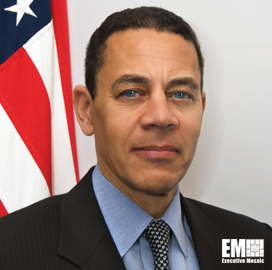 “Former FCC chairman and U.S. ambassador to the European Union William Kennard (pictured) has been named chairman of the board of directors for telecom giant and WarnerMedia parent company AT&T. Kennard had been an AT&T director since 2014,” Alex Weprin reported Friday for the Hollywood Reporter.
“Former FCC chairman and U.S. ambassador to the European Union William Kennard (pictured) has been named chairman of the board of directors for telecom giant and WarnerMedia parent company AT&T. Kennard had been an AT&T director since 2014,” Alex Weprin reported Friday for the Hollywood Reporter.
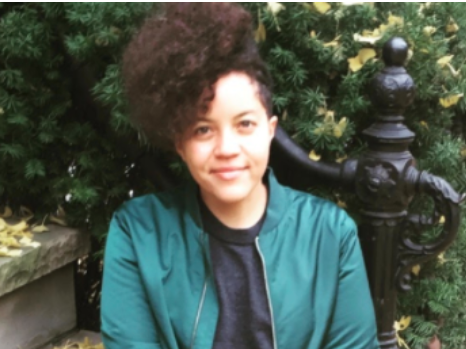 Jane Coaston, who has been a senior politics reporter focusing on conservatism, the American right, the G.O.P. and white nationalism at Vox, will lead the New York Times podcast “The Argument” starting Nov. 29, the Times announced Friday. “Each week for the last two years, our hosts, including Michelle Goldberg, Ross Douthat, David Leonhardt and Frank Bruni, held candid debates around deeply felt topics, all while managing to find a way to hear each other, no matter how disparate their positions seemed to be,” the editors said.
Jane Coaston, who has been a senior politics reporter focusing on conservatism, the American right, the G.O.P. and white nationalism at Vox, will lead the New York Times podcast “The Argument” starting Nov. 29, the Times announced Friday. “Each week for the last two years, our hosts, including Michelle Goldberg, Ross Douthat, David Leonhardt and Frank Bruni, held candid debates around deeply felt topics, all while managing to find a way to hear each other, no matter how disparate their positions seemed to be,” the editors said.
- The Reporters Committee for Freedom of the Press has produced a primer on press freedom issues on tribal lands within the United States. “Tribal law varies widely across the hundreds of Indigenous nations,” legal intern Annie Cappetta and staff attorney Sarah Matthews wrote. “Rather than address each tribal nation’s laws, this guide highlights important trends and takeaways for journalists. . . . This guide does not replace the legal advice of an attorney. Journalists with additional questions or in need of assistance should contact the Reporters Committee’s legal hotline.”
-
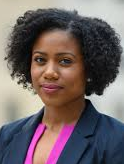 NBC News NOW, (the network’s 24/7 streaming channel) has hired reporters Priscilla Thompson (pictured, above), Maura Barrett and Isabelle Gutierrez (pictured, below).
NBC News NOW, (the network’s 24/7 streaming channel) has hired reporters Priscilla Thompson (pictured, above), Maura Barrett and Isabelle Gutierrez (pictured, below).
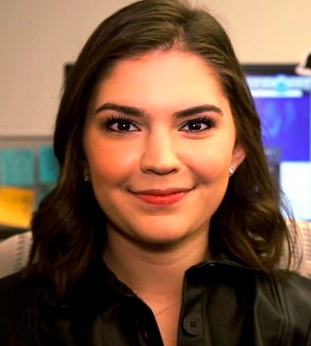 Janelle Rodriguez, SVP of editorial for NBC News and executive-in-charge of NBC News NOW, made the announcement Tuesday. Thompson and Barrett were campaign embed reporters for NBC News; Gutierrez is a reporter with NBC LX, the digital news brand and streaming network geared toward Gen Z and millennial audiences.
Janelle Rodriguez, SVP of editorial for NBC News and executive-in-charge of NBC News NOW, made the announcement Tuesday. Thompson and Barrett were campaign embed reporters for NBC News; Gutierrez is a reporter with NBC LX, the digital news brand and streaming network geared toward Gen Z and millennial audiences.
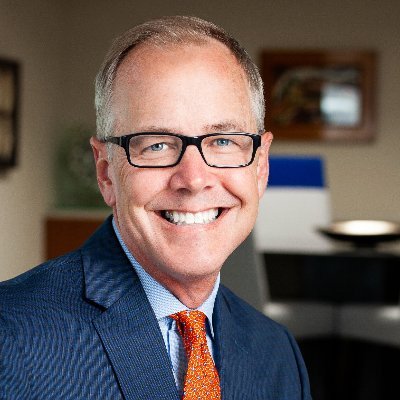 “Mark Lodato (pictured) is the new dean of S.I. Newhouse School of Public Communications at Syracuse University,” Paul Greeley reported Tuesday for TV News Check. He succeeds Lorraine Branham, who died in April 2019. “Lodato brings a deep background of local TV news and university teaching and administration experience to the position. . . .”
“Mark Lodato (pictured) is the new dean of S.I. Newhouse School of Public Communications at Syracuse University,” Paul Greeley reported Tuesday for TV News Check. He succeeds Lorraine Branham, who died in April 2019. “Lodato brings a deep background of local TV news and university teaching and administration experience to the position. . . .”
- In Britain, cricket journalism is “an industry that does not reflect the UK population, whether it be in terms of gender, ethnicity, socio-economic background, education, sexual orientation, able-bodiedness or geography,” Isabelle Westbury wrote for Wisden Cricket Monthly, republished Wednesday in The Guardian. “For cricket, a straightforward explanation for this disconnect is that the sport’s media reflects a game which itself lacks diversity. . . .”
- “International press groups expressed concern Tuesday about a spike in the number of journalists killed in Mexico, after three were murdered within the space of 10 days,” the Associated Press reported. “The Committee to Protect Journalists, Reporters Without Borders and the Inter American Press Association urged Mexico to do more to investigate the killings and protect journalists. The CPJ lists Mexico as the deadliest country in the world for journalists in 2020.”
- The Committee to Protect Journalists called on Ethiopian authorities to immediately release broadcast journalist Bekalu Alamrew, who was arrested on November 4 and has not been formally charged,” the Committee said on Tuesday. “Three uniformed police officers and one plain-clothed officer arrested Bekalu from the Addis Ababa offices of the privately-owned Awlo Media Center, where Bekalu is employed, according to the outlet’s managing director Woldegiorgis Teklay, who spoke with CPJ via messaging app. . . .”
- “A Filipino journalist who survived a previous attempt on his life by pretending to be dead has been killed outside his home, police have said,” Agence France-Presse reported Tuesday. “Virgilio Maganes, 62, who was a commentator for DWPR radio station in the northern province of Pangasinan, died instantly after he was shot six times by motorcycle-riding gunmen, Major Christian Alucod told AFP. The National Union of Journalists of the Philippines (NUJP) condemned the murder, which it said was the 18th such killing since Rodrigo Duterte became president in 2016. . . .”
- “Authorities in Nigeria should immediately release Oga Tom Uhia, the publisher of local monthly magazine Power Steering, which covers the electrical power sector, and drop all charges against him,” the Committee to Protect Journalists said Nov. 4. “On October 13, police arrested Uhia at his residence in Gwarimpa, a suburb of Nigeria’s capital, Abuja, without a warrant and took him to the Force Criminal Investigation Department, according to Uhia’s lawyer, Evans Odeh. . . . “
- In Nigeria, what began as peaceful demonstrations against the country’s corruption and police brutality turned fatal on Oct. 20, when the Nigerian military opened fire at the Lekki tollgate plaza, in Lagos,” Ivie Ani reported Nov. 2 for Columbia Journalism Review. “According to Amnesty International, officers killed thirty-eight protesters, in what was soon called ‘the Lekki Massacre.’ The same day, the National Broadcasting Commission (NBC), Nigeria’s media regulator, released a set of guidelines, stipulating that outlets — which ‘have a duty to promote the corporate existence of Nigeria’ — should not ’embarrass individuals, organizations, government, or cause disaffection, incite to panic or rift in the society at large.’ All the while, the government was suppressing vital information and obscuring tragic details about attacks on citizens. . . .”
- “Last Thursday (Oct. 29), Manaus was the scene of another episode of aggression against press freedom in Brazil,” LatAm Journalism Review reported Thursday, citing Amazônia Real. “What was supposed to be a press conference by the deputy governor of Amazonas, Carlos Almeida Filho (PTB), was converted into a speech and assaults by Military Police Sergeant Michele Welche Silva Lobo against journalists Rosiene Carvalho, who specializes in politics and is a reporter for Band News radio and UOL correspondent; Jullie Pereira, reporter and presenter of the site Amazonas Atual; Cynthia Blink, reporter for Rádio Mix and the site O Amazonês; and photojournalist Adriano Santos, from the site Manaós. . . .What followed were attacks on the press.”
- In Peru, on Oct. 27, police officers in the southern Peruvian city of Ica raided the Cadena Sur TV station as well as Radio Sistema and Radio La Mega, all three of which are privately owned, following a complaint by Mónica Guillén, the wife of Ica state governor Javier Gallegos, according to a statement by the Lima-based Institute for Press and Society (IPYS). The Committee to Protect Journalists reported Nov. 3 that “The raids – during which police confiscated computers and cell phones and disconnected transmitters, forcing all three outlets off the air – came in response to Guillén’s criminal complaint alleging cyber harassment filed in July with the attorney general’s office in Ica, news reports said. She claimed to have been targeted by anonymous people who repeatedly mocked her on the social media platform TikTok with vulgar language, according to news reports. . . .”
- “A score of Guatemalan journalists spoke out this Tuesday in front of the public prosecutor’s office against the criminalization and censorship of their profession, such as the criminal prosecution of their Indigenous K’iche’ colleague Anastasia Mejía Tiriquiz,” the EFE news service reported Nov 3. “Last Wednesday, a Guatemalan judge in the north of the country processed Indigenous journalist Anastasia Mejía Tiriquiz for the crimes of sedition, arson and aggravated attack.”
To subscribe at no cost, please send an email to journal-isms-subscribe@yahoogroups.com and say who you are.
Facebook users: “Like” “Richard Prince’s Journal-isms” on Facebook.
Follow Richard Prince on Twitter @princeeditor
Richard Prince’s Journal-isms originates from Washington. It began in print before most of us knew what the internet was, and it would like to be referred to as a “column.” Any views expressed in the column are those of the person or organization quoted and not those of any other entity. Send tips, comments and concerns to Richard Prince at journal-isms-owner@yahoogroups.com
View previous columns (after Feb. 13, 2016).
- Diversity’s Greatest Hits, 2018 (Jan. 4, 2019)
- Book Notes: Is Taking a Knee Really All That? (Dec. 20, 2018)
- Book Notes: Challenging ’45’ and Proudly Telling the Story (Dec. 18, 2018)
- Book Notes: Get Down With the Legends! (Dec. 11, 2018)
- Journalist Richard Prince w/Joe Madison (Sirius XM, April 18, 2018) (podcast)
- Richard Prince (journalist) (Wikipedia entry)
- February 2018 Podcast: Richard “Dick” Prince on the need for newsroom diversity (Gabriel Greschler, Student Press Law Center, Feb. 26, 2018)
- Diversity’s Greatest Hits, 2017 — Where Will They Take Us in the Year Ahead?
- Book Notes: Best Sellers, Uncovered Treasures, Overlooked History (Dec. 19, 2017)
- An advocate for diversity in the media is still pressing for representation, (Courtland Milloy, Washington Post, Nov. 28, 2017)
- Morgan Global Journalism Review: Journal-isms Journeys On (Aug. 31, 2017)
- Diversity’s Greatest Hits, 2016
- Book Notes: 16 Writers Dish About ‘Chelle,’ the First Lady
- Book Notes: From Coretta to Barack, and in Search of the Godfather
- Journal-isms’ Richard Prince Wants Your Ideas (FishbowlDC, Feb. 26, 2016)
- “JOURNAL-ISMS” IS LATEST TO BEAR BRUNT OF INDUSTRY’S ECONOMIC WOES (Feb. 19, 2016)
- Richard Prince with Charlayne Hunter-Gault,“PBS NewsHour,” “What stagnant diversity means for America’s newsrooms” (Dec. 15, 2015)
- Book Notes: Journalists Follow Their Passions
- Book Notes: Journalists Who Rocked Their World
- Book Notes: Hands Up! Read This!
- Book Notes: New Cosby Bio Looks Like a Best-Seller
- Journo-diversity advocate turns attention to Ezra Klein project (Erik Wemple, Washington Post, March 5, 2014)
.

